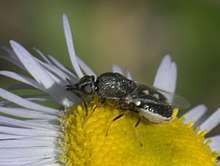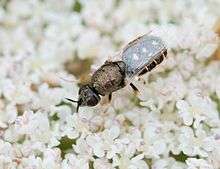Nemotelus
Nemotelus is a genus of soldier flies in the family Stratiomyidae. There are at least 190 described species in Nemotelus.[2][3][4][5][6] Nemotelus is known from the Nearctic, Afrotropical and the Palaearctic regions.
.jpg) Nemotelus pantherinus lateral view
Nemotelus pantherinus lateral view
| Nemotelus | |
|---|---|
 | |
| Nemotelus kansensis | |
| Scientific classification | |
| Kingdom: | Animalia |
| Phylum: | Arthropoda |
| Class: | Insecta |
| Order: | Diptera |
| Family: | Stratiomyidae |
| Subfamily: | Nemotelinae |
| Genus: | Nemotelus Geoffroy, 1762 |
| Type species | |
| Musca pantherinus | |
| Diversity | |
| at least 190 species | |
| Synonyms | |
Nemotelus are among the smallest (4.0 to 8.0 mm. ) Stratiomyidae.The species are black or (most) black with more or less, often greatly extended white spots; the colouring is different in the two sexes.The head is round but the face has a pointed snout bearing the antennae on the dorsal side.The facial lobe, below the antennae, is conical and prominent and the whole facial area is pushed anteriorly by the expansion of the parafacials, and of the frons immediately above the antennae. The eyes of the male almost meet, and the eyes have smaller facets in the ventral part . The proboscis is geniculate. Body-shape and wing-venation are generally similar to that of Oxycera except that R4+5 is usually forked, and R 2+a is faint.The basal segment of gonopods in male on the lower side is fused with the hypandrium which has two more or less elongated median outgrowths;basal segment with lateral outgrowth at apex on outer side. Nemotelus species are not lively, and are easily caught with the fingers.They occur in the neighbourhood of water, in fens and similar localities, where they often are seen on the flowers of Umbelliferae and Compositae, sometimes in large numbers. Some of them seem to prefer salt marshes. [7] [8] [9]
Selected Species
- Subgenus Camptopelta
- N. aldrichi (Williston, 1917)[10]
- N. nigrinus Fallén, 1817
- N. wilfordhansoni (Woodley, 2001)[11]
- Subgenus Nemotelus
- N. albitarsis Lindner, 1965[12]
- N. annulipes Lindner, 1965[12]
- N. assimilis Lindner, 1965[12]
- N. barracloughi (Mason, 1997)[13]
- N. basilaris (Woodley, 2001)[11]
- N. mongolia (Woodley, 2001)[11]
- N. natalensis Lindner, 1965[12]
- N. nigribasis Lindner, 1965[12]
- N. notatus Zetterstedt, 1842
- N. pantherinus (Linnaeus, 1758)
- N. stuckenbergi Lindner, 1965[12]
- N. tricolor Lindner, 1965[12]
- N. tschorsnigi (Mason, 1997)[13]
- N. uliginosus (Linnaeus, 1767)
See also
References
- Kertész, Kálmán (1923). "Vorarbeiten zur einer Monographie der Notacanthen. XLV--L". Ann. Mus. Natl. Hung. 18: 85–129.
- "Nemotelus Report". Integrated Taxonomic Information System. Retrieved 2018-04-25.
- "Nemotelus". GBIF. Retrieved 2018-04-25.
- "Nemotelus Genus Information". BugGuide.net. Retrieved 2018-04-25.
- "Fauna Europaea". European Commission. Retrieved 5 January 2012.
- Stubbs, A. & Drake, M. (2001). British Soldierflies and Their Allies: A Field Guide to the Larger British Brachycera. British Entomological & Natural History Society. pp. 512 pp. ISBN 1-899935-04-5.
- George Henry VerrallStratiomyidae and succeeding families of the Diptera Brachycera of Great Britain- British flies (1909)BHL Full text with illustrations
- E. P. Narchuk in Bei-Bienko, G. Ya, 1988 Keys to the insects of the European Part of the USSR Volume 5 (Diptera) Part 2 English edition. Keys to Palaearctic species but now needs revision.
- Seguy. E. Faune de France Faune n° 13 1926. Diptères Brachycères. 308 p., 685 fig.
- Williston, Samuel Wendel (1917). "Camptopelta, a new genus of Stratiomyidae". Details - Annals of the Entomological Society of America. 10: 23–26. Retrieved 4 June 2017.
- Woodley, N. E. (2001). "A world catalog of the Stratiomyidae (Insecta: Diptera)". Myia. 11: [vi]+475.
- Lindner, Erwin (1965). "Stratiomyidae (Diptera Brachycera))". Exploration of Garamba National Park : Mission de H. Saeger. 46: 45–65.
- Mason, F. (1997). "The Afrotropical Nemotelinae (Diptera, Stratiomyidae)". Monografie/Museo Reg. Sci. Nat., Torino. 24: 1–312.
